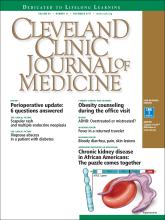The question posed in the 1-Minute Consult by Zambrano and Burguera1 in this issue of Cleveland Clinic Journal of Medicine forces us to evaluate the current management of one of our nation’s most costly and devastating health problems. On the front lines of this battle are primary care providers who face the challenge of delivering effective obesity counseling in a limited time frame.
See related article, page 835
Zambrano and Burguera highlight the 2011 Centers for Medicare and Medicaid Services reimbursement program for obesity counseling using intensive behavioral therapy.2 The program supports and provides incentives in the form of time and reimbursement to primary care providers to discuss obesity with patients. But fewer than 1% of Medicare beneficiaries use the program.
While doctors often cite lack of time as a barrier to effectively counseling patients on weight, no clear evidence suggests that more time beyond the usual “5 minutes” of counseling is effective. The real issue is how a patient is counseled, not how long.
Physicians commonly resort to the simple message of “eat less and move more,” and tell patients that they “should” lose weight (as if patients with obesity don’t already know they should lose weight), which clearly is not helpful. Recently, a patient told me her primary care physician came into the examination room and told her that she needs to lose 15 to 20 pounds. “We can do it,” he said, clapped his hands, and left. This message is no more effective than telling a person with depression to “cheer up.”
WEIGHT BIAS
Zambrano and Burguera succinctly outline a targeted approach to reimbursable obesity counseling. But another obstacle to effective counseling that needs to be addressed is weight bias. Weight bias refers to negative attitudes and beliefs toward people with obesity and is common among healthcare professionals. Doctors too often believe people with obesity are lazy, eat too much, and lack the willpower to maintain a healthy diet. As a result, doctors may spend less time, have less discussion, and fail to consider effective treatment options for patients with obesity.
Weight loss is difficult for the patient and for the physician. Many still believe that people with obesity can ameliorate their condition simply by eating less. Rather than label the lack of weight loss or weight regain as a failure of the patient with obesity, we should consider this a poor response to the treatment. When chemotherapy is not effective or when someone requires insulin for their diabetes, do we blame the patient? There is a double standard for obesity, and it highlights a lack of understanding of obesity and weight bias. These historic beliefs are at odds with growing evidence indicating the pathogenesis of obesity involves a far more complex process, consisting of genetic, developmental, and environmental factors.3
LANGUAGE MATTERS
Obesity is not a lifestyle choice but rather a dysfunction of a highly regulated system. We need to help patients navigate the process of trying to lose weight in a nonjudgmental way, understanding that language matters. We should pay attention to our comments, recognizing that pejorative words (eg, morbid, fat) may contribute to patient shame and impair the effectiveness of behavioral change counseling. We need to self-identify negative assumptions and stereotypes and empathize with our patients. Learning about our own implicit bias through an online test (eg, Project Implicit4) and using “person-first” language (eg, “patient with obesity” instead of “obese patient”) are simple steps we can take to support our patients.5
REALISTIC EXPECTATIONS, EFFECTIVE OPTIONS
Setting expectations is crucial in the shared decision-making process. We need to be optimistic that a 5% to 10% loss of body weight can significantly improve many chronic diseases, but realistic that not everyone will respond the same way. Establishing 3- to 6-month end points is an appropriate way to gauge treatment response and pursue different treatment options in those who do not respond.
Antiobesity drugs may be effective combined with lifestyle interventions and may be considered in patients who have not responded to behavioral modification. Once thought to be a barbaric operation that should be reserved as a last resort, bariatric surgery remains the most effective treatment for obesity, resulting in a 20% to 35% body weight loss after 1 year. And a recent study showed sustained weight loss and effective remission and prevention of type 2 diabetes.6
To believe that all forms of obesity are the same and thus should have one treatment option is narrow-minded. We do not treat all cancers the same, nor do we treat all diabetes the same. Obesity is no different.
Effective obesity counseling in the limited time frame of an office visit is essential, but we also need to change the way we approach patients with obesity. We should pay attention to how we treat our patients with excess weight and empathize with their condition as we do with every other patient. We should be willing to treat obesity as the disease that it is and look beyond the scale. In the end, 20 minutes may not solve the problem, but it can begin the process.
- Copyright © 2017 The Cleveland Clinic Foundation. All Rights Reserved.






